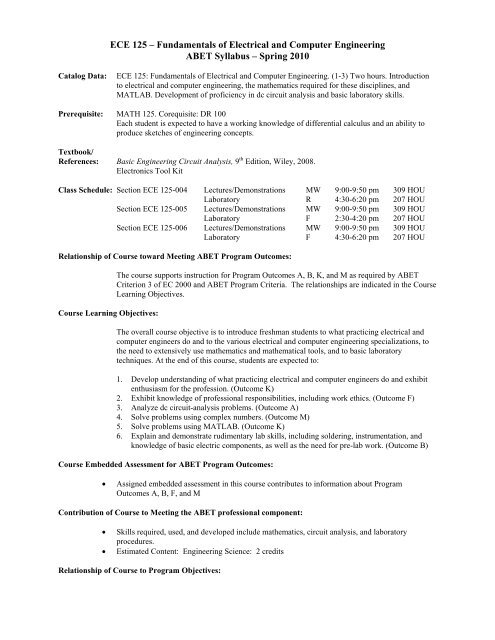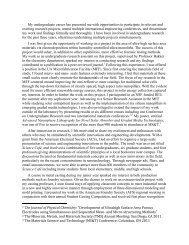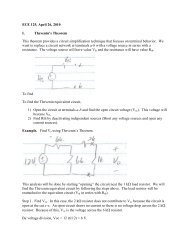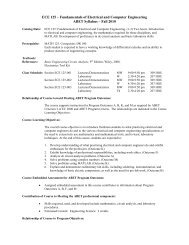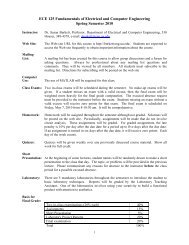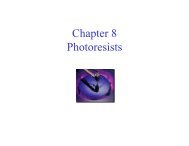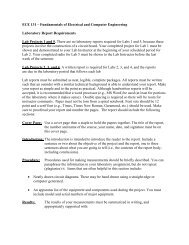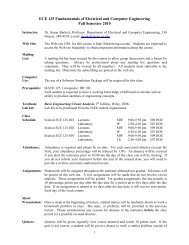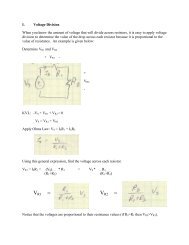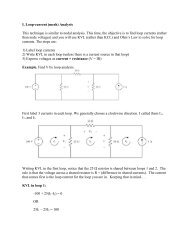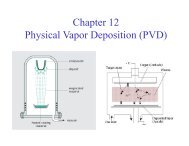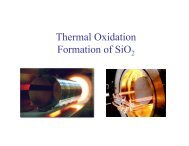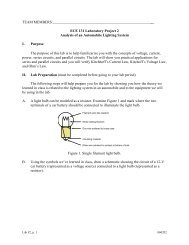ECE 125 â Fundamentals of Electrical and Computer Engineering ...
ECE 125 â Fundamentals of Electrical and Computer Engineering ...
ECE 125 â Fundamentals of Electrical and Computer Engineering ...
Create successful ePaper yourself
Turn your PDF publications into a flip-book with our unique Google optimized e-Paper software.
<strong>ECE</strong> <strong>125</strong> – <strong>Fundamentals</strong> <strong>of</strong> <strong>Electrical</strong> <strong>and</strong> <strong>Computer</strong> <strong>Engineering</strong><br />
ABET Syllabus – Spring 2010<br />
Catalog Data:<br />
<strong>ECE</strong> <strong>125</strong>: <strong>Fundamentals</strong> <strong>of</strong> <strong>Electrical</strong> <strong>and</strong> <strong>Computer</strong> <strong>Engineering</strong>. (1-3) Two hours. Introduction<br />
to electrical <strong>and</strong> computer engineering, the mathematics required for these disciplines, <strong>and</strong><br />
MATLAB. Development <strong>of</strong> pr<strong>of</strong>iciency in dc circuit analysis <strong>and</strong> basic laboratory skills.<br />
Prerequisite: MATH <strong>125</strong>. Corequisite: DR 100<br />
Each student is expected to have a working knowledge <strong>of</strong> differential calculus <strong>and</strong> an ability to<br />
produce sketches <strong>of</strong> engineering concepts.<br />
Textbook/<br />
References: Basic <strong>Engineering</strong> Circuit Analysis, 9 th Edition, Wiley, 2008.<br />
Electronics Tool Kit<br />
Class Schedule: Section <strong>ECE</strong> <strong>125</strong>-004 Lectures/Demonstrations MW 9:00-9:50 pm 309 HOU<br />
Laboratory R 4:30-6:20 pm 207 HOU<br />
Section <strong>ECE</strong> <strong>125</strong>-005 Lectures/Demonstrations MW 9:00-9:50 pm 309 HOU<br />
Laboratory F 2:30-4:20 pm 207 HOU<br />
Section <strong>ECE</strong> <strong>125</strong>-006 Lectures/Demonstrations MW 9:00-9:50 pm 309 HOU<br />
Laboratory F 4:30-6:20 pm 207 HOU<br />
Relationship <strong>of</strong> Course toward Meeting ABET Program Outcomes:<br />
Course Learning Objectives:<br />
The course supports instruction for Program Outcomes A, B, K, <strong>and</strong> M as required by ABET<br />
Criterion 3 <strong>of</strong> EC 2000 <strong>and</strong> ABET Program Criteria. The relationships are indicated in the Course<br />
Learning Objectives.<br />
The overall course objective is to introduce freshman students to what practicing electrical <strong>and</strong><br />
computer engineers do <strong>and</strong> to the various electrical <strong>and</strong> computer engineering specializations, to<br />
the need to extensively use mathematics <strong>and</strong> mathematical tools, <strong>and</strong> to basic laboratory<br />
techniques. At the end <strong>of</strong> this course, students are expected to:<br />
1. Develop underst<strong>and</strong>ing <strong>of</strong> what practicing electrical <strong>and</strong> computer engineers do <strong>and</strong> exhibit<br />
enthusiasm for the pr<strong>of</strong>ession. (Outcome K)<br />
2. Exhibit knowledge <strong>of</strong> pr<strong>of</strong>essional responsibilities, including work ethics. (Outcome F)<br />
3. Analyze dc circuit-analysis problems. (Outcome A)<br />
4. Solve problems using complex numbers. (Outcome M)<br />
5. Solve problems using MATLAB. (Outcome K)<br />
6. Explain <strong>and</strong> demonstrate rudimentary lab skills, including soldering, instrumentation, <strong>and</strong><br />
knowledge <strong>of</strong> basic electric components, as well as the need for pre-lab work. (Outcome B)<br />
Course Embedded Assessment for ABET Program Outcomes:<br />
• Assigned embedded assessment in this course contributes to information about Program<br />
Outcomes A, B, F, <strong>and</strong> M<br />
Contribution <strong>of</strong> Course to Meeting the ABET pr<strong>of</strong>essional component:<br />
• Skills required, used, <strong>and</strong> developed include mathematics, circuit analysis, <strong>and</strong> laboratory<br />
procedures.<br />
• Estimated Content: <strong>Engineering</strong> Science: 2 credits<br />
Relationship <strong>of</strong> Course to Program Objectives:
Topics Covered During Class:<br />
The course supports Program Objectives 1, 2, <strong>and</strong> 3 by developing an underst<strong>and</strong>ing <strong>of</strong> the<br />
practice <strong>of</strong> electrical <strong>and</strong> computer engineering; a knowledge <strong>of</strong> dc circuit analysis, complex<br />
numbers, MATLAB, <strong>and</strong> experimental abilities; <strong>and</strong> an appreciation for work ethics.<br />
1. Course organization <strong>and</strong> requirements (1 hr)<br />
2. Introduction to the electrical <strong>and</strong> computer engineering disciplines (1 hr)<br />
3. Introduction to electrical <strong>and</strong> computer engineering specializations (4 hrs)<br />
4. Direct-current circuit analysis (fundamentals <strong>of</strong> electricity, resistors, KVL,<br />
KCL, node <strong>and</strong> loop analysis, practical sources, maximum power transfer) (9 hrs)<br />
5. Introduction to capacitance <strong>and</strong> inductance (1 hr)<br />
6. Introduction to electronics <strong>and</strong> operational amplifiers (2 hrs)<br />
7. Complex algebra <strong>and</strong> introduction to ac circuit analysis, phasors, <strong>and</strong> impedance (6 hrs)<br />
8. Introduction to MATLAB (3 hrs)<br />
9. 3 Mid-term examinations (3 hrs)<br />
10. Final comprehensive examination (2.5 hrs)<br />
30 hours total<br />
plus 2.5-hour final<br />
Laboratory:<br />
Five (5) laboratory projects related to the course material are performed throughout the semester.<br />
The projects are as follows:<br />
1. Lab procedures, safety, soldering, <strong>and</strong> component mounting (2 hrs)<br />
2. Analyzing an automobile lighting system (2 hrs)<br />
3. Creative Exercise combining engineering <strong>and</strong> art principles (2 hrs)<br />
4. Basic op-amp circuits (2 hrs)<br />
5. Building an AM radio (2 hrs)<br />
10 hours total<br />
Prepared by: Susan L. Burkett Date: 10 January 2010


